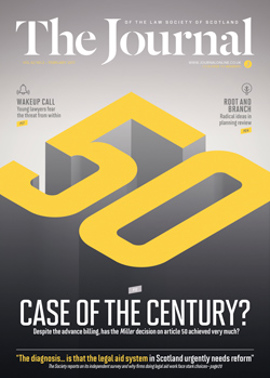Where courts fear to tread

What does the decision in Miller mean for the Sewel convention and the role of the devolved governments?
It concluded: “We do not underestimate the importance of constitutional conventions, some of which play a fundamental role in the operation of our constitution. The Sewel convention has an important role in facilitating harmonious relationships between the UK Parliament and the devolved legislatures. But the policing of its scope and the manner of its operation does not lie within the constitutional remit of the judiciary, which is to protect the rule of law” (para 151).
Although Professor Page argues above that the Sewel convention has not been devalued as a result of this ruling, as it “remains no less politically binding than before”, Professor Aileen McHarg of Strathclyde University believes the decision has deprived s 2 of the Scotland Act 2016 of any meaningful purpose. That was the provision that added to the Scotland Act 1998, after the declaration that the power of the UK Parliament to make laws for Scotland was unaffected, the new s 28(8): “But it is recognised that the Parliament of the United Kingdom will not normally legislate with regard to devolved matters without the consent of the Scottish Parliament.”
Speaking to the Journal, McHarg comments: “The Supreme Court said its purpose was to entrench Sewel as a convention, but I regard that as meaningless. Entrenchment means you have some special status which is protected. But there is no alternative to protection by the courts, so they have essentially deprived s 2 of any meaningful purpose... effectively they have very quickly exposed s 2 as what many people thought it was, a piece of window dressing.”
She questions whether the court in fact paid sufficient attention to the precedents, particularly the freedom of information appeal concerning Prince Charles and the “black spider” memos, appealed to the Supreme Court as R (Evans) v Attorney General [2015] UKSC 21. At an earlier stage, in deciding whether the balance of the public interest favoured disclosure, the Upper Tribunal engaged in a very detailed analysis of the conventions surrounding the Prince of Wales, taking evidence on the meaning of the conventions from experts like Adam Tomkins. It considered the Jennings test for identifying conventions, the precedents, the reasons for the rule and the attitude of those involved, before concluding ultimately that the conventions were not engaged: “So we have domestic examples of the meaning of conventions being debated in court. The Northern Ireland High Court in Miller was also prepared to say what it thought the convention meant.”
Political teeth
Although it recognised the importance of the convention, if the court is not prepared to “police” its operation, can anything be done to make Sewel more than just a statement of intent? Paul Reid, advocate, suggests there may be – and indeed that something needs to be found to avoid the devolution settlement, amid the ongoing tensions between the Scottish and UK Governments, becoming further destabilised. In a blog for the UK Constitutional Law Association he writes:
“The current controversy surrounding the Sewel convention does not detract from the sound rationale for its existence, and that is reflected in its hitherto unqualified acceptance in both London and Edinburgh. If policing it is to be left to the politicians (as the general orthodoxy would have suggested even before the Supreme Court’s decision), then the current dispute suggests that the convention should be armed with some other political teeth.
“For example, just as a minister must certify that a bill is compatible with ECHR rights when introduced, a minister could be required to certify whether a bill includes matters on which consent should be sought from a devolved institution. That may, as here, be controversial. If the minister were to answer that question ‘yes’, the Speaker could then be required to seek that consent unless the minister certified that it should not be sought. Such a certification would no doubt call for an explanation. Such a procedure could be introduced by revising the standing orders.
“Ordinarily, obtaining such consent would be entirely uncontroversial, but where the UK Government wished to proceed without the consent of the devolved legislature (such as here, where consent would be unlikely to be given), the Government would be forced to face the political price of that decision (and to explain it) at the earliest stage.”
The imperative to consult
Much of the argument in relation to Miller has assumed that Sewel is invoked by the article 50 process. The Supreme Court took no position on this, though McHarg complains that the UK Government's reaction “has been to take a very particular interpretation of whether Sewel was engaged, and to refuse to discuss the matter... the UK Government has presented it as the court saying it was not engaged, which is a problem but there is no obvious way to challenge that, other than to apply political pressure”.
She accepts it is unlikely that the UK Government and Parliament will respect any legislative consent motion passed by Holyrood, “although there remains a strong argument that one is required”. Looking ahead to the next stage, the proposed “Great Repeal Bill” to remove the European Communities Act, she believes that it will be harder for the UK Government to maintain the same stance, “because you have a much more direct effect on devolved competence and the scope of devolved competence”. Though again, if it does, there would be no recourse other than political pressure: “Any prospect of an appeal is going to be very difficult in the face of an 11-0 ruling from the Supreme Court.”
A different emphasis appears from a new paper for the Gwilym Gibbon Centre at Nuffield College by Professor Jim Gallagher, entitled “Conventional Wisdom: Brexit, Devolution and the Sewel Convention”. Gallagher’s argument is that convention or no convention, the devolved administrations clearly must be consulted in the process of leaving the EU, “and the consultation must be substantive and not just pro forma. Not to do so would be bad governance”. This is because the necessary changes cannot be made effective across the UK without the cooperation of the devolved administrations.
Identifying three stages of exit legislation – the article 50 bill, the Great Repeal Bill and whatever further legislation is needed to give effect to new relationships with the EU, or new policy frameworks to replace European ones – he considers there is a greater requirement to seek devolved consent the further down the line we go. With the article 50 bill, requiring devolved consent could result in a veto power, so it is hard to make the case for Sewel here. With the Great Repeal Bill, to the extent that it preserves existing UK law there is no argument for Sewel either, but to the extent that it replaces it, even at technical levels (as is bound to happen), consent would be required. And devolved consent is “quite likely” to be required at the third stage; but “ministers’ approaches at earlier stages will condition the legislation which will in due course require consent, and this emphasises the need for intergovernmental consultation about them”.
In short, “If the UK Government wishes to avoid stubbing its toes against the need to secure devolved consent further down the line, it will be wise to engage early on”. And, restating the theme of his paper at Journal, November 2016, 12, he argues that there is an opportunity, if the political vision is there, to produce new and more durable governance arrangements within the UK.
Whose win?
Did the Miller decision actually achieve very much for those who brought the case? McHarg suggests that it was something of an “empty victory”, one reason being that “It exposes the point that there is not a huge difference between prerogative powers and statutory powers. If all you’ve achieved is to give the Prime Minister an unlimited discretion to invoke article 50, as a matter of statute even if not of prerogative, it’s not entirely clear what you’ve gained from that.” It remains to be seen whether Parliament will be able to achieve any greater control over the Brexit process that it would otherwise have had.
Has its importance, then, been overstated? While describing Miller as “an incredibly important constitutional case”, McHarg comments that the decision “was not terribly adventurous – I think it was quite a conservative decision in some ways”. She explains: “On everything except the central point about the need for statutory authorisation the majority were unwilling to say very much – unwilling to say what kind of bill was required, unwilling to say anything very much about the Sewel convention, the status of the referendum, so it was quite a narrow decision in some ways.”
It may, she adds, have both forced a confrontation over the meaning and status of the Sewel convention which it would probably have been wiser to avoid, and “polarised and hardened positions” over parliamentary control of the Brexit process in a way that is ultimately unhelpful.
Perhaps all the more need, then, to take up Reid’s approach, expressed in relation to Sewel: “The court may simply be an observer, watching on as the children fight. But something should be in place to try and avoid, or at least minimise, such fights in the future if we are to maintain anything that resembles a harmonious, coherent, stable and workable devolution settlement.”
In this issue
- Miller, Brexit and BreUK-up
- Power to the people?
- Prerogatives, Parliament and the constitution: plus ça change?
- Decisions in high places
- Reading for pleasure
- Journal magazine index 2016
- Opinion: Callum Sinclair
- Book reviews
- Profile
- President's column
- Have you heard of ScotLIS?
- People on the move
- Article 50: the final say
- Where courts fear to tread
- "Wake up": how young lawyers see the future
- How healthy is our legal aid system?
- Challenging assumptions
- Planning to deliver
- Contact and the fear factor
- And the bill goes to...?
- Pakistan to join Child Abduction Convention
- Dress to impress?
- Handcuffing of prisoners and article 3
- Turning up the heat on workplace change
- Scottish Solicitors' Discipline Tribunal
- Not just for the green welly brigade
- Five by five
- Law reform roundup
- Relief over pensions and bankruptcy ruling
- Helpline plus
- Spill the beans on legal aid fraud
- The art of bringing the good news
- Cybercrime: how are you protected?
- Ask Ash
- One year rule becomes three
- From the Brussels office






